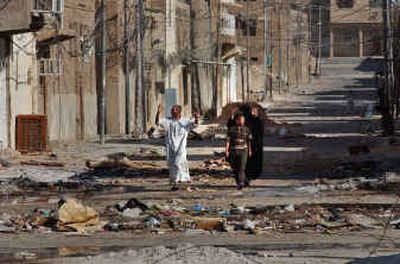No thoughts of surrender

NAJAF, Iraq – The pigeons in the Imam Ali shrine were flying out of the vast courtyard on Monday into a sky filled with the smell of blood and the echoes of urban warfare.
The shrine’s other residents – about 500 exhausted supporters of rebel cleric Muqtada al-Sadr – slept in patches of shade as U.S.-led forces crushed their comrades in intense street battles just outside the compound. Sniper bullets danced about the ankles of the rebels who ran across the street and through the shrine’s ornate doors.
This was day 19 of the standoff in the Shiite Muslim holy city of Najaf. No one inside the sanctuary was talking about a peaceful outcome.
“If we hand over the keys to the shrine, will that end the occupation of Iraq?” asked Sheik Ahmad Sheibani, a top al-Sadr aide in the shrine. “If the Iraqi forces come in, we’ll fight. We’ll all fight.”
The countdown is on for those who remain in the shrine. It’s been days since U.S.-backed interim Iraqi government gave al-Sadr “hours” to vacate the shrine before an elite unit of Iraqi national guardsmen threatened to reclaim the heart of Najaf.
The negotiations did nothing. Al-Sadr hasn’t appeared publicly in a week. Meanwhile, the U.S. military perimeter around the compound shrank and the bombs moved closer.
At nightfall on Monday, U.S. attacks increased. The unmistakable buzz of an AC-130 gunship could be heard. Nine or 10 times by midnight, aircraft could be heard circling overhead, followed by a whistling sound and the explosion of a bomb. Shrapnel flew into the shrine’s courtyard.
Mahdi Army members kept their spirits up with chants of “we’re with you, Muqtada. We’ll die for you, Muqtada.” They staged an impromptu rally at midnight, marching through the courtyard.
Mahdi Army wounded were brought in throughout the evening to a makeshift trauma center in the shrine. A little girl hit by shrapnel was carried in, too.
Outside the shrine, militiamen and American troops continued their mutual hunt throughout the day, blasting through a desolate commercial district that used to bustle with Iranian pilgrims.
Down one decrepit alley, a door swung open and Mahdi Army fighters emerged carrying a body trailing penny-sized drops of blood. The walk through the wasted land around the shrine is a pins-and-needles trip, in which a sniper could be behind every creaky door or swinging open shutter.
At one bend in the labyrinth of alleys, a group of young boys with rocket-propelled grenade launchers sauntered up to a Knight Ridder reporter and offered to lead the way to the shrine. “Don’t be scared,” said one sweet-faced boy with a black scarf tied pirate-style on his head. He clutched his launcher as a thunderous explosion shook the ancient path.
The hard-core fighters stayed outside. Only a handful of armed men ventured inside the shrine, where few weapons were visible. Mostly, al-Sadr supporters cherished their relative safety and wondered how long it would last.
“There must be a result from all this,” said Haider Qassim, 33, who sold shoes before joining al-Sadr’s forces. “Blood just can’t spill like this for nothing. Why? Why were all those people killed?”
Young men curled up in brilliantly tiled nooks to read the Quran. There was public praise for a man from the western Sunni town of Fallujah who’s now fighting with the Shiite-dominated Mahdi Army. Sunni and Shiite Muslims are traditional rivals.
Most of the Shiite supporters weren’t from Najaf; several begged to use a satellite phone to check in with loved ones. “Please let me call my mother in Baghdad,” a 14-year-old boy pleaded. “She has no idea whether I’m alive or dead.”
As night fell, streams of tiny electric lights illuminated the deep blue of the shrine. The darkness also hid shrapnel-chipped tiles and the bullet-speckled landmark golden dome. An imam’s voice boomed over the loudspeaker, claiming rebels had burned three American tanks. Most worshippers perched on mats were too tired to cheer.
In the un-air-conditioned offices of the shrine, a volunteer brought a large tray of white rice topped with a navy bean sauce. The meals came courtesy of women who have husbands or brothers on the front lines. They said they’d abandoned their homes to act as human shields and helpers during the uprising.
Two dark-eyed 7-year-old girls both named Fatima tugged at a reporter’s sleeve during a renewed wave of bombings.
“Are you scared?” one asked with a nervous giggle.
“A little,” the reporter answered. “Are you?”
“No, not me,” she said, “I’m army. Mahdi Army.”